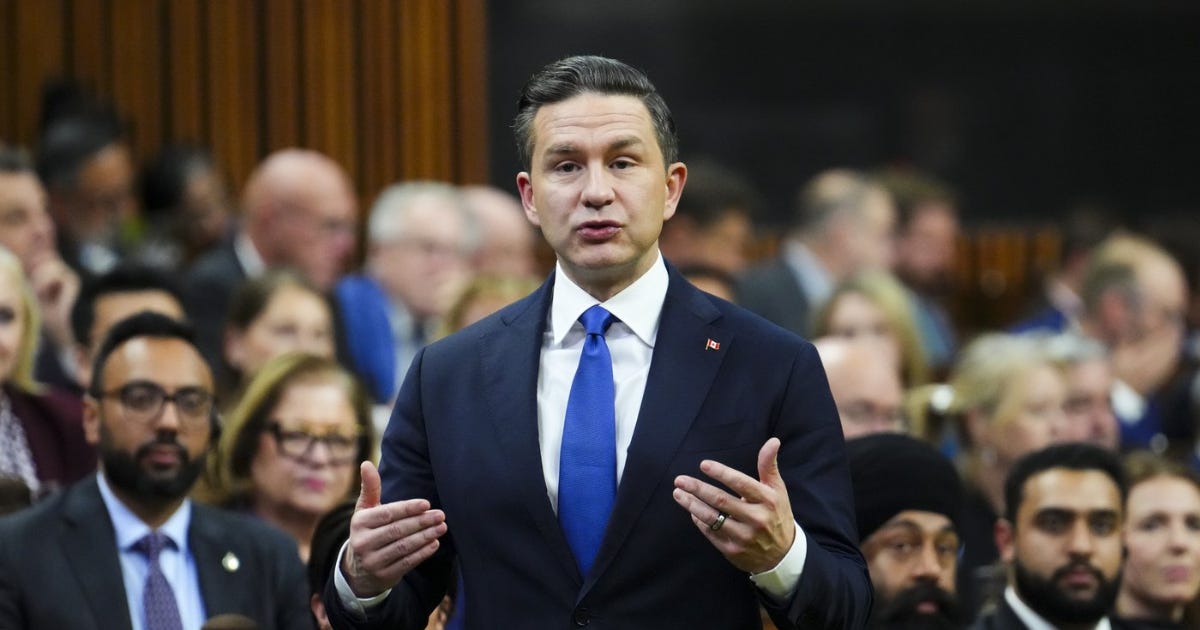Conservatives, Liberals spar over B.C. NDP pipeline veto powers
The Liberal government has effectively given British Columbia a veto over Alberta’s Pacific pipeline, a move immediately slammed by Conservatives, even as Prime Minister Mark Carney visited Calgary.
The Liberal government has effectively given British Columbia a veto over Alberta’s Pacific pipeline, a move immediately slammed by Conservatives, even as Prime Minister Mark Carney visited Calgary to talk about federal-provincial cooperation on energy projects.
The criticism came during Question Period, where Conservative Leader Pierre Poilievre pressed Liberal ministers on the government’s newly announced memorandum of understanding (MOU) with Alberta. The Prime Minister was absent, travelling to Calgary for an event tied to the agreement.
At issue is the federal commitment to only advance a future pipeline proposal with the support of the B.C. government and First Nations — a condition restated again Thursday by Environment Minister Julie Dabrusin.
“We need to ensure the agreement of British Columbia and of First Nations,” Dabrusin told the House. “That is an important part of how we work toward building a strong Canada.”
Poilievre challenged the position, warning that conditioning any future pipeline on provincial consent amounted to surrendering federal authority over interprovincial infrastructure. He argued the government was delaying the project until after the next election and empowering B.C. opponents to block it.
“Isn’t it true that this isn’t a pipeline? It’s a pipe dream,” Poilievre said, suggesting the Liberals were attempting to signal different messages in Ottawa and Alberta. He told the Commons the government was “dangling a possible pipeline” while preparing to hand Premier David Eby the means to stop it altogether.
Carney, meanwhile, told reporters in Calgary that the MOU with Alberta was a “first step” in establishing a regulatory pathway for major projects. He confirmed that any pipeline would require Indigenous partnership and provincial engagement but did not specify how the government would proceed if B.C.’s NDP government withheld approval.
In a late-day development, Canadian Identity and Culture Minister Steven Guilbeault announced his resignation from cabinet, posting a three-page statement on X in which he declared his “strong opposition” to the Alberta-Ottawa memorandum.
Guilbeault said there had been “no consultation” with B.C. or West Coast First Nations, warned a pipeline to the coast would cause “significant” environmental damage, and argued the MOU dismantles core elements of the Liberals’ climate plan, including clean electricity regulations and the framework to eliminate fossil-fuel subsidies.
He said he will continue to sit in the House as a Liberal MP.
The agreement outlines Ottawa’s willingness to accelerate an approval process once Alberta submits a formal proposal, but construction remains years away.
Federal officials also acknowledged this week that the industrial carbon price embedded in the deal represents what Carney described as a six-fold increase in the effective rate applied to large emitters — a point drawing further criticism from the taxpayer watchdog.
B.C. Premier David Eby and coastal First Nations groups have since stated they will oppose the project outlined in the Alberta-Ottawa MOU. Eby said Thursday that the province does not support a pipeline that would increase tanker traffic on B.C.’s North Coast, citing existing restrictions and environmental concerns.





It's a show folks and it's Carney.
This fraud has arranged so many outs for himself there are so many holes in what he says Swiss Cheese looks solid.
Well, the conservatives make a good show for opposition. But there is no need for an opposition. No one listens to them. The conman and his commies have this country all sowed up. The conservatives are just a novelty, collecting a big pay check.